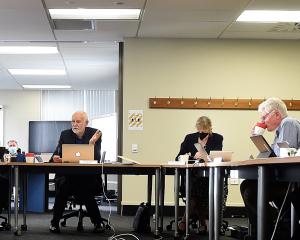A senior doctor's letter the Southern District Health Board tried for months to keep secret warns of a ''very real'' risk a patient will die because of a ''crisis'' in its Dunedin Hospital ear, nose, and throat department.
The board this week released the March 21 letter on the advice of Ombudsman Ron Paterson. Citing privacy, it initially refused to release the letter, and others requested, and the Otago Daily Times complained to the Office of the Ombudsman.
The health board said yesterday ''proper triage'' of ear, nose, and throat (ENT) patients meant the service was improving and surgery waiting lists had reduced.
The service was in crisis because of a lack of resources, department clinical leader Jamie Ryan told chief executive Carole Heatly in the letter.
''We have now had eight months of reduced theatre access and more to come, creating a crisis in our service.''
The crisis developed when the board halted outsourcing to Mercy Hospital, in Dunedin, in the middle of last year, to cut costs. Outsourcing some child and skin cancer patients had been used to take pressure off waiting lists as the Dunedin department lacked in-house treatment capacity.
''The waiting times for skin cancer are now unacceptable and are resulting in patients requiring more extensive surgery [such as neck dissections for lymph node metastasis] and the need for a general anaesthetic.
''The risk of an avoidable death from delayed treatment for melanoma or squamous cell carcinoma is very real.''
For young patients, treatment delays could cause ''significant'' health and learning effects from lack of access to procedures such as grommet insertion.
In December last year, 82 children were waiting for grommets - 58% more than in the middle of the year.
Patients on ''active review'', meaning they are monitored by their GP in case they deteriorate, increased 47% during the same time period, to 148 patients.
The letter called for a resumption of outsourcing to Mercy Hospital and an in-house Saturday clinic as short-term measures, while the development of extra treatment space and other improvements were investigated.
The ''tired and cramped'' facility in Dunedin had been reviewed multiple times ''and on each occasion the recommendation has been that a new larger department is required'', but nothing had happened.
The department's workload had doubled in the past decade, probably because of Central Otago sun exposure and the ageing population.
Unlike ENT departments in other health boards, Dunedin handled neck and head skin cancer surgery in addition to the usual ENT caseload, meaning additional pressure.
Surgical medical director Murray Fosbender, through a spokesman, said management had met the department's leadership team to discuss the problems and a plan was developed.
Asked if there was still a risk a patient could die, Mr Fosbender said this was being managed by ''proper triage to ensure that all patients are prioritised by clinicians and those with high risk are treated urgently''. Surgery waiting lists were reducing without the need to outsource the work, he said.
Asked for up-to-date waiting list figures, he said these would be available next week. Since the March warning letter, Mercy Hospital has performed nine ear, nose, and throat procedures for the health board, the private hospital said yesterday.
Director of clinical services Philippa Pringle said the hospital performed two procedures in April and seven in May.











